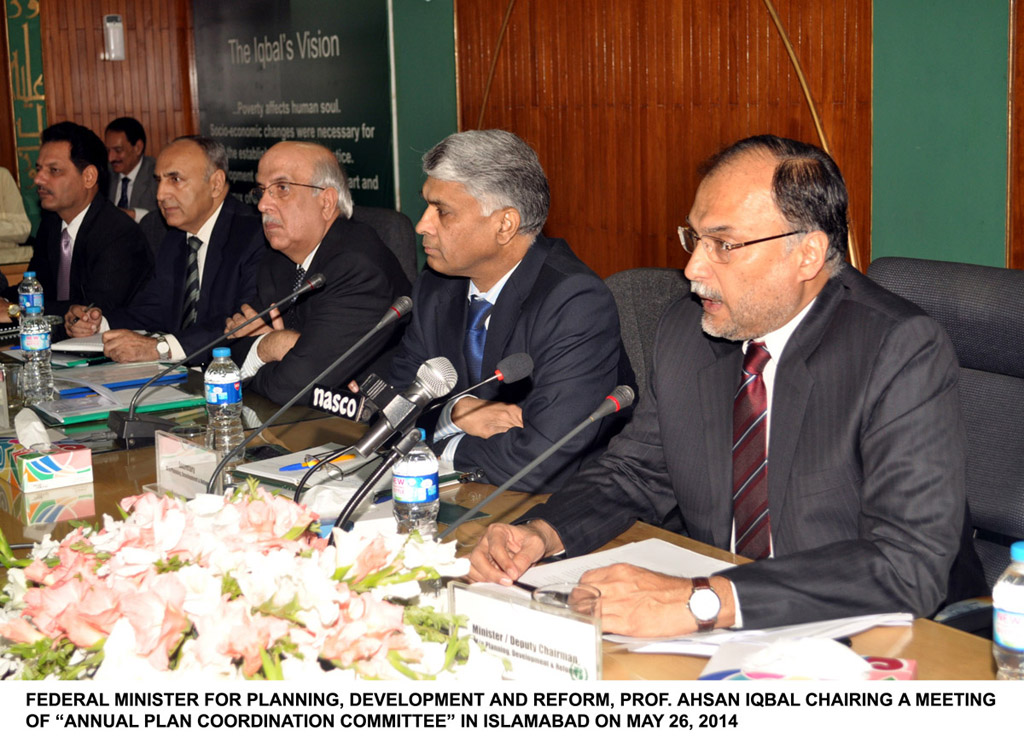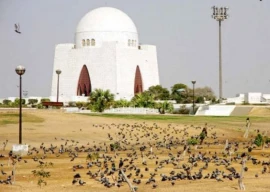
Headed by Federal Minister for Planning and Development Ahsan Iqbal, the Annual Plan Coordination Committee will today (Tuesday) consider at least Rs1.46 trillion development spending bill for the four provinces and the federal government for the new fiscal year, starting from July.
The APCC’s recommendations will then be taken up by the National Economic Council, meeting next Monday under the chair of Prime Minister Nawaz Sharif.
The national development budget of over Rs1.46 trillion will be the highest in the country’s history, although the provinces often spend less than the allocations due to multiple reasons.
The final figure of national development budget is not firmed up yet, as the Sindh government did not share its Annual Development Programme allocation with the Planning Ministry till late Monday evening. This created problems for the federal government in preparing the working paper of the APCC meeting.
The other three provinces have timely shared their annual development budgets with the Planning Ministry.
The federal Public Sector Development Programme (PSDP) has been proposed at Rs580 billion – Rs55 billion or 10% higher than the outgoing fiscal year’s Rs525 billion budget. The Ministry of Planning and Development has demanded Rs758 billion to meet the financing needs of on-going as well as new projects that will be initiated under the China-Pakistan Economic Corridor.
However, the Finance Ministry has so far proposed Rs580 billion on-budget developments spending while expenses on some of the projects like Karachi Nuclear Power Plant will be carried out by keeping them outside the federal PSDP.
At least Rs260 billion will alone be required for CPEC-related development projects, said Iqbal.
However, major spending push is coming from the provinces that are proposing significant increases despite Finance Ministry’s desire to save money from their budgets to keep the overall budget deficit at the level agreed with the International Monetary Fund (IMF).
Pakistan and the IMF have already reached an agreement to restrict the budget deficit to 4.3% of the GDP or Rs1.341 trillion in the next fiscal year.
In a briefing to Senate Standing Committee on Finance, Secretary Finance Dr Waqar Masood said that the federal government was betting on provinces to save 0.8% to 1% of the GDP to keep overall budget deficit at 4.3% of the GDP. In absolute terms, the Finance Ministry wants the four provinces to throw around Rs300 billion savings next year.
In order to lure the provinces, the Finance Ministry is giving mark-up on the savings shown by the provinces. The Secretary Finance had said that in the outgoing fiscal year the provinces would earn roughly Rs16 billion on account of budget surpluses.
However, contrary to the centre’s desire, the provinces are proposing huge increases in their development budgets.
Punjab has proposed Rs452 billion annual development programme –higher by Rs122 billion or 36%. Khyber-Pakhtunkhwa has proposed Rs124 billion – higher by Rs51.3 billion or 70%.
Meanwhile, Balochistan government has proposed Rs60 billion, which is about 20% higher than the original budget of the outgoing fiscal year.
Published in The Express Tribune, May 26th, 2015.
Like Business on Facebook, follow @TribuneBiz on Twitter to stay informed and join in the conversation.
1731570357-0/elon-musk-(1)1731570357-0-405x300.webp)
-(1)1717678110-0/Kendrick-(1)-(1)1717678110-0-165x106.webp)






1732428532-0/BeFunk_§_]__-(43)1732428532-0.jpg)








COMMENTS
Comments are moderated and generally will be posted if they are on-topic and not abusive.
For more information, please see our Comments FAQ